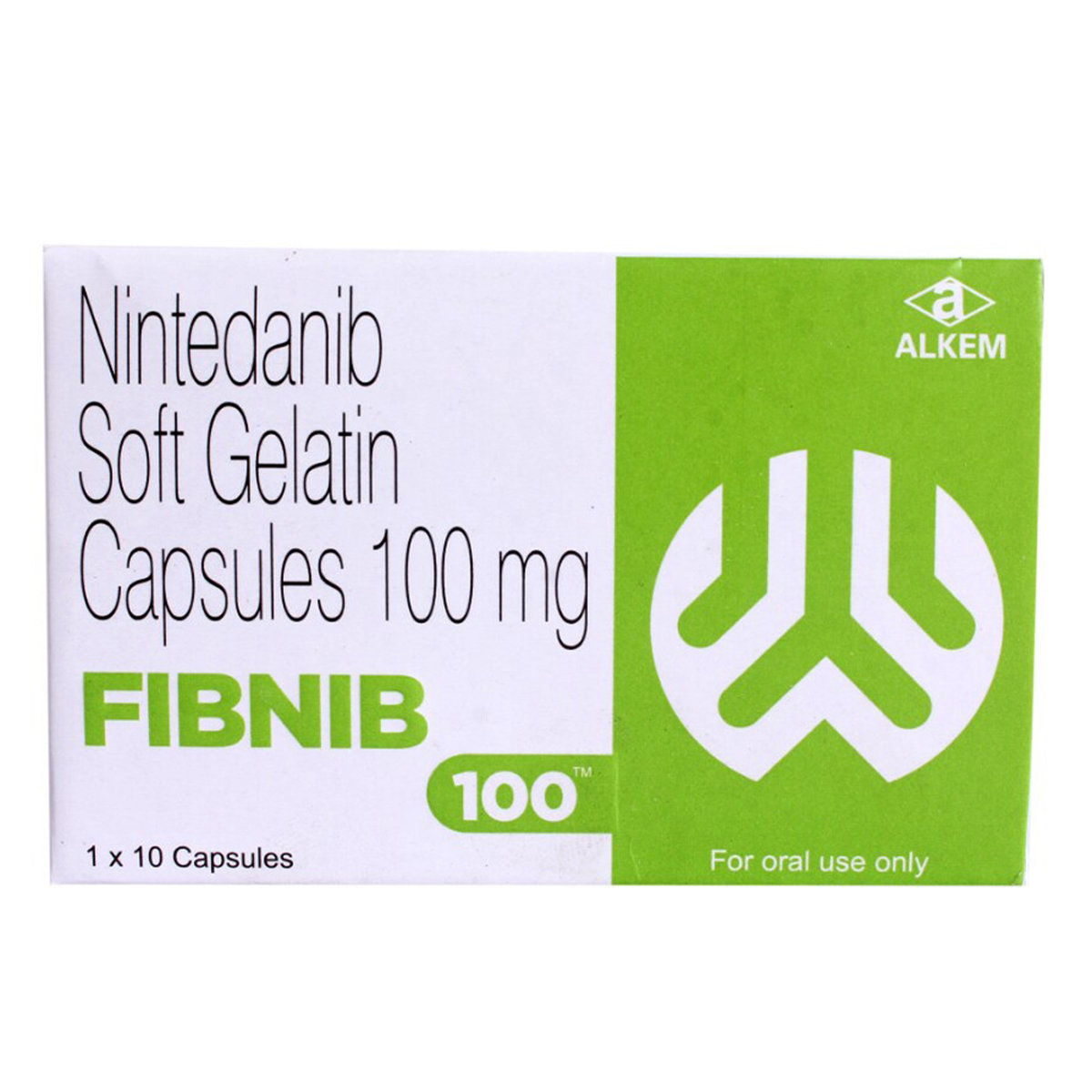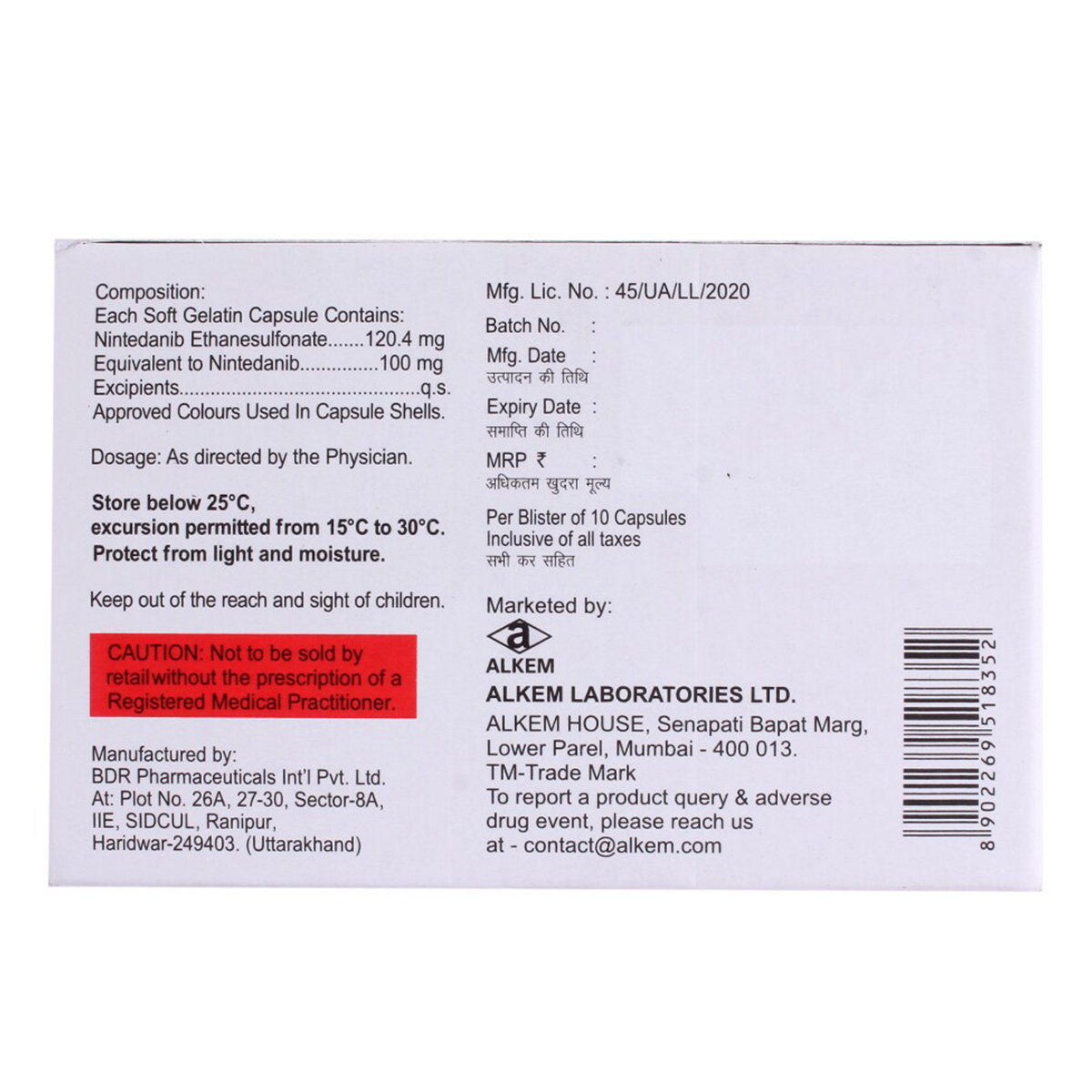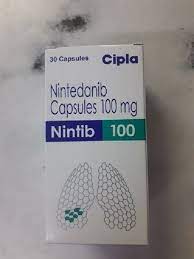Fibnib 100 Softgel Capsule 10's
MRP ₹932.5
(Inclusive of all Taxes)
₹139.9 Cashback (15%)
Know Your Delivery Time
Provide Delivery Location

Secure Payment

India's Most Trusted Pharmacy

Genuine Products
Composition :
Manufacturer/Marketer :
Consume Type :
Expires on or after :
Return Policy :
About Fibnib 100 Softgel Capsule
Fibnib 100 Softgel Capsule is primarily used to treat idiopathic pulmonary fibrosis (IPF) in adults. IPF is an irreversible disease marked by a progressive decline in lung function. The tissues in the lungs become swollen and scarred over time, which makes it difficult to breathe deeply.
Fibnib 100 Softgel Capsule contains nintedanib, which helps reduce the scarring and swelling in the lungs by decreasing the release of naturally occurring growth factors in the body, allowing you to breathe better.
In some cases, you may experience common side effects such as nausea, tiredness, diarrhoea, indigestion, loss of appetite, headache, and photosensitivity. Most of these side effects do not require medical attention and will resolve gradually over time. However, talk to your doctor if you experience these side effects persistently.
Inform your doctor if you are allergic to Fibnib 100 Softgel Capsule . Consult your doctor before taking Fibnib 100 Softgel Capsule if you are pregnant or breastfeeding. Fibnib 100 Softgel Capsule is not recommended for children below 18 years as safety and effectiveness have not been established. Consult your doctor if you are breastfeeding; your doctor will decide whether Fibnib 100 Softgel Capsule can be taken by breastfeeding mothers or not.
Uses of Fibnib 100 Softgel Capsule
Fibnib 100 Softgel Capsule is used in the treatment of Idiopathic pulmonary fibrosis. The detailed uses of Fibnib 100 Softgel Capsule are as follows: Treatment of Idiopathic pulmonary fibrosis
- Idiopathic pulmonary fibrosis: Fibnib 100 Softgel Capsule aids in the breakdown and thinning of mucus in the airways, facilitating coughing and removal. It is especially beneficial in conditions like Idiopathic pulmonary fibrosis.

Have a query?
Directions for Use
- Fibnib 100 Softgel Capsule should be taken with meals to enhance its effectiveness.
- It is recommended to take Fibnib 100 Softgel Capsule twice daily or as advised by your doctor.
- Swallow Fibnib 100 Softgel Capsule as a whole with a glass of water.
- Do not crush, chew, or open it.
Key Benefits
- Fibnib 100 Softgel Capsule is an anti-fibrotic medicine used to treat idiopathic pulmonary fibrosis (IPF) in adults.
- Fibnib 100 Softgel Capsule can help effectively slow the rate of lung function decline by 50%.
- Fibnib 100 Softgel Capsule helps reduce the scarring and swelling in the lungs by decreasing the release/activity of naturally occurring growth factors in the body, allowing you to breathe better.
- Fibnib 100 Softgel Capsule helps in slowing down the progress of idiopathic pulmonary fibrosis.
How Fibnib 100 Softgel Capsule Works
Storage
- Inform Your Doctor: Notify your doctor immediately about your diarrhoea symptoms. This allows them to adjust your medication or provide guidance on managing side effects.
- Stay Hydrated: Drink plenty of fluids to replace lost water and electrolytes. Choose water, clear broth, and electrolyte-rich drinks. Avoid carbonated or caffeinated beverages to effectively rehydrate your body.
- Follow a Bland Diet: Eat easy-to-digest foods to help firm up your stool and settle your stomach. Try incorporating bananas, rice, applesauce, toast, plain crackers, and boiled vegetables into your diet.
- Avoid Trigger Foods: Steer clear of foods that can worsen diarrhoea, such as spicy, fatty, or greasy foods, high-fibre foods, and dairy products (especially if you're lactose intolerant).
- Practice Good Hygiene: Maintain good hygiene to prevent the spread of infection. To stay healthy, wash your hands frequently, clean and disinfect surfaces regularly, and avoid exchanging personal belongings with others.
- Take Anti-Diarrheal Medications: If your doctor advises, anti-diarrheal medications such as loperamide might help manage diarrhoea symptoms. Always follow your doctor's directions.
- Keep track of your diarrhoea symptoms. If they don't get better or worse or are accompanied by severe stomach pain, blood, or dehydration signs (like extreme thirst or dark urine), seek medical help.
- Inform your doctor about the nausea and discuss possible alternatives to the medication or adjustments to the dosage.
- Divide your daily food intake into smaller, more frequent meals to reduce nausea.
- Opt for bland, easily digestible foods like crackers, toast, plain rice, bananas, and applesauce.
- Avoid certain foods that can trigger nausea, such as fatty, greasy, spicy, and smelly foods.
- Drink plenty of fluids, such as water, clear broth, or electrolyte-rich beverages like coconut water or sports drinks.
- Use ginger (tea, ale, or candies) to help relieve nausea.
- Get adequate rest and also avoid strenuous activities that can worsen nausea.
- Talk to your doctor about taking anti-nausea medication if your nausea is severe.
- Record when your nausea occurs, what triggers it, and what provides relief to help you identify patterns and manage your symptoms more effectively.
- Preventing Vomiting (Before it Happens)
- Take medication exactly as prescribed by your doctor. This can help minimize side effects, including vomiting.
- Having a small meal before taking your medication can help reduce nausea and vomiting.
- Talk to your doctor about taking anti-nausea medication along with your prescribed medication.
- Managing Vomiting (If it Happens)
- Try taking ginger in the form of tea, ale, or candy to help alleviate nausea and vomiting.
- What to Do if Vomiting Persists
- Consult your doctor if vomiting continues or worsens, consult the doctor for guidance on adjusting your medication or additional treatment.
- Drink water or other clear fluids.
- To prevent worsening of pain, limit intake of tea, coffee, or alcohol.
- Include bland foods like rice, toast, crackers, and rice in your diet.
- Avoid lying down immediately after eating as it may cause indigestion or heartburn.
- Avoid acidic and spicy food as it may cause indigestion.
- Avoid other medicines that increase the risk of bleeding.
- Use an electric razor and a soft-bristled toothbrush.
- Monitor for signs of bleeding like bleeding gums, unusual bruising, blood in stool, nosebleeds, or heavy menstrual bleeding.
- If you experience severe bleeding, apply direct pressure on the wound and consult a doctor promptly.
- If the risk of bleeding is high, discuss with your doctor about possibility of switching to different medicine with a lower bleeding risk.
What if I have taken an overdose of Fibnib 100 Softgel Capsule
Drug Warnings
- Do not use Fibnib 100 Softgel Capsule if you are allergic to any components present in Fibnib 100 Softgel Capsule .
- Fibnib 100 Softgel Capsule can cause harm to the fetus, women of childbearing potential should be advised to avoid becoming pregnant while receiving treatment with Fibnib 100 Softgel Capsule .
- Consult your doctor if you are breastfeeding; your doctor will decide whether the Fibnib 100 Softgel Capsule can be taken by breastfeeding mothers or not.
- Keep your doctor informed about your health condition and medicines to rule out any side effects.
- Fibnib 100 Softgel Capsule may cause tiredness and dizziness, so drive with caution.
- Avoid consuming alcohol with Fibnib 100 Softgel Capsule as it could lead to increased dizziness.
- Fibnib 100 Softgel Capsule is not recommended for children below 18 years as safety and effectiveness have not been established.
Drug-Drug Interactions
Drug-Drug Interactions
Login/Sign Up
Coadministration of Fibnib 100 Softgel Capsule and Rifapentine can reduce the blood levels of Fibnib 100 Softgel Capsule.
How to manage the interaction:
There may be a possibility of interaction between Fibnib 100 Softgel Capsule and Rifapentine, but it can be taken if prescribed by a doctor. Contact your doctor if your symptoms do not improve. Do not discontinue any medications without consulting your doctor.
Coadministration of Fibnib 100 Softgel Capsule with Fosphenytoin can reduce the levels of Fibnib 100 Softgel Capsule. This can lead to low treatment outcomes.
How to manage the interaction:
Although there is a possible interaction between Fibnib 100 Softgel Capsule and Fosphenytoin, you can take these medicines together if prescribed by your doctor. Do not stop using any medications without a doctor's advice.
Co-administration of Leflunomide and Fibnib 100 Softgel Capsule can increase the risk of liver problems.
How to manage the interaction:
Co-administration of Leflunomide and Fibnib 100 Softgel Capsule can lead to an interaction, they can be taken together if prescribed by a doctor. However, if you experience fever, chills, joint pain or swelling, unusual bleeding or bruising, skin rash, itching, less desire to eat, fatigue, nausea, vomiting, abdominal pain, or yellowing of the skin or eyes, contact a doctor immediately. Do not discontinue any medications without consulting a doctor.
Coadministration of Fibnib 100 Softgel Capsule and primidone can reduce the blood levels of Fibnib 100 Softgel Capsule.
How to manage the interaction:
Although there is an interaction between Fibnib 100 Softgel Capsule and primidone, it can be taken if prescribed by a doctor. However, if you experience any unusual symptoms, contact a doctor immediately. Do not discontinue any medications without consulting a doctor.
Coadministration of Fibnib 100 Softgel Capsule with Rifampicin can decrease the blood levels of Fibnib 100 Softgel Capsule, which may make the medication less effective.
How to manage the interaction:
Although there is an interaction between Fibnib 100 Softgel Capsule and rifampicin, they can be taken together if prescribed by a doctor. Do not discontinue any medications without consulting a doctor.
Taking Phenobarbital and Fibnib 100 Softgel Capsule can drastically lower Fibnib 100 Softgel Capsule levels in the blood, making the medicine less effective in treating the illness.
How to manage the interaction:
Although taking phenobarbital with Fibnib 100 Softgel Capsule can lead to interaction, they can be taken if recommended by a doctor. Contact a doctor if your symptoms do not improve. Do not stop using any medications without talking to a doctor.
Coadministration of Fibnib 100 Softgel Capsule and Tipranavir can reduce the blood levels of Fibnib 100 Softgel Capsule.
How to manage the interaction:
There may be a possibility of interaction between Fibnib 100 Softgel Capsule and Tipranavir, but it can be taken if prescribed by a doctor. Contact your doctor if your symptoms do not improve. Do not discontinue any medications without first consulting your doctor.
Co-administration of Lomitapide and Fibnib 100 Softgel Capsule can increase the risk of liver problems.
How to manage the interaction:
Co-administration of Lomitapide and Fibnib 100 Softgel Capsule can lead to an interaction, but it can be taken if your doctor advises. However, if you experience any symptoms like fever, chills, joint pain, unusual bleeding, skin rash, vomiting, abdominal pain, dark-colored urine, light-colored stools, and/or yellowing of the skin or eyes, contact your doctor immediately. Do not discontinue any medications without first consulting your doctor.
Coadministration of Teriflunomide and Fibnib 100 Softgel Capsule can increase the risk of liver problems.
How to manage the interaction:
Coadministration of Teriflunomide and Fibnib 100 Softgel Capsule can lead to an interaction, but it can be taken if your doctor advises. However, if you experience any symptoms like fever, chills, joint pain, unusual bleeding, skin rash, loss of appetite, vomiting, abdominal pain, dark-colored urine, light-colored stools, and/or yellowing of the skin or eyes, contact your doctor immediately.
Coadministration of Phenytoin and Fibnib 100 Softgel Capsule may decrease the blood levels of Fibnib 100 Softgel Capsule, which may reduce Fibnib 100 Softgel Capsule's effectiveness.
How to manage the interaction:
Although taking Phenytoin and Fibnib 100 Softgel Capsule together can result in an interaction, it can be taken when your doctor has prescribed it. Contact a doctor if your symptoms do not improve. Do not stop taking any drugs without consulting a doctor.
Drug-Food Interactions
Drug-Food Interactions
Login/Sign Up
Diet & Lifestyle Advise
- Watch out for triggers that worsen the cough, such as smoke, foods, air-conditioning, high altitude, etc.
- Exercise moderately. Eat healthily.
- Follow pulmonary rehabilitation program. It includes exercise, disease education, and group therapy.
- Quit smoking and alcohol.
- Get ample rest.
- Include green leafy vegetables, sweet potatoes, broccoli, tomatoes, carrots, mangoes, citrus fruits, berries, and cocoa.
- Lean proteins such as fish, meat, and poultry are the best.
- Hydration is important. Drink plenty of water, herbal tea, and vegetable and fruit juices.
- Avoid processed and refined foods.
Habit Forming
Therapeutic Class
All Substitutes & Brand Comparisons
RX
Nintib 100 Capsule 30's
Cipla Ltd
₹86
(₹2.58 per unit)
96% CHEAPERRX
Prutis 100 Softgel Capsule 10's
Hetero Drugs Ltd
₹609
(₹54.81 per unit)
34% CHEAPERRX
Out of StockMacdanib 100 Softgel Capsule 10'S
Macleods Pharmaceuticals Ltd
₹690
(₹62.1 per unit)
26% CHEAPER
Alcohol
Safe if prescribed
It is not known if alcohol interacts with Fibnib 100 Softgel Capsule . However, as a precautionary measure, you are recommended not to consume alcohol with the Fibnib 100 Softgel Capsule to avoid unpleasant side effects.
Pregnancy
Consult your doctor
Fibnib 100 Softgel Capsule is listed as pregnancy category D. Because Fibnib 100 Softgel Capsule can cause harm to the fetus, women of childbearing potential should be advised to avoid becoming pregnant while receiving treatment with Fibnib 100 Softgel Capsule .
Breast Feeding
Consult your doctor
Consult your doctor if you are breastfeeding; your doctor will decide whether Fibnib 100 Softgel Capsule can be taken by breastfeeding mothers or not.
Driving
Safe if prescribed
Fibnib 100 Softgel Capsule may significantly influence your ability to drive and use machines. You should not drive or operate machinery if you feel sick.
Liver
Consult your doctor
Dose adjustment may be needed. Fibnib 100 Softgel Capsule is not recommended for patients with severe hepatic impairment. Please consult your doctor if you have a liver impairment or any concerns.
Kidney
Consult your doctor
Dose adjustment may be needed. Fibnib 100 Softgel Capsule is not recommended for patients with an end-stage renal disease requiring dialysis. Please consult your doctor if you have kidney impairment or any concerns.
Children
Safe if prescribed
Fibnib 100 Softgel Capsule is not recommended for children below 18 years as safety and effectiveness have not been established.
Heart
Inform your doctor if you have any existing heart disease. Your doctor will prescribe this medicine only if the potential benefits outweigh the risks.
Geriatrics
Consult your doctor
Fibnib 100 Softgel Capsule should be given with caution in elderly patients due to an increased risk of side effects. Please consult your doctor before using Fibnib 100 Softgel Capsule .
FAQs
Fibnib 100 Softgel Capsule is used to treat idiopathic pulmonary fibrosis (IPF), a disease marked by a progressive decline in lung function.
Fibnib 100 Softgel Capsule helps reduce the scarring and swelling in the lungs by decreasing the release/activity of naturally occurring growth factors in the body, thereby helping you breathe better.
Avoid smoking before starting the treatment while taking Fibnib 100 Softgel Capsule as smoking might alter the effectiveness of Fibnib 100 Softgel Capsule .
Fibnib 100 Softgel Capsule should be stopped when a person faces a serious side effect that affects life quality. Otherwise, it would be best to keep taking Fibnib 100 Softgel Capsule until your doctor asks you to stop it.
If you have any surgery, including dental surgery, please inform your doctor if you are taking Fibnib 100 Softgel Capsule as your doctor might stop Fibnib 100 Softgel Capsule before undergoing surgery.
In elderly patients, the risk of side effects is higher if you are taking Fibnib 100 Softgel Capsule . For the patients who are elderly, dose adjustment might be required, or your doctor might prescribe any other medication safe for the elderly.
It is not recommended to discontinue the Fibnib 100 Softgel Capsule without consulting your healthcare provider. Abruptly stopping the medication can lead to disease progression or other complications. Consult your healthcare provider for personalised guidance if you have concerns or experience side effects.
If you forget to take a dose of Fibnib 100 Softgel Capsule , take it as soon as you remember. However, if it's almost time for your next dose, skip the missed dose and continue with your regular dosing schedule. Do not double up on doses to make up for the missed one, as this can increase the risk of side effects.
Common side effects of Fibnib 100 Softgel Capsule may include nausea, tiredness, diarrhoea, indigestion, loss of appetite, headache, and photosensitivity in some individuals. Most of these side effects do not require medical attention and will resolve gradually over time. However, if you experience these side effects persistently, inform your doctor.
Fibnib 100 Softgel Capsule is not recommended for use in patients with severe liver impairment. Please consult your doctor if you have a liver impairment or any concerns before Fibnib 100 Softgel Capsule .
Country of origin
Manufacturer/Marketer address
Disclaimer
Author Details
We provide you with authentic, trustworthy and relevant information











